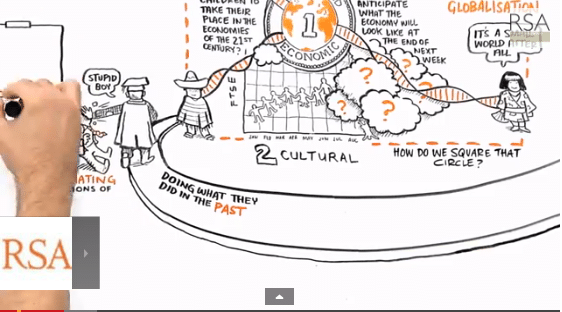Why our educational system is stamping out “children as widgets” – a great video with Sir Ken Robinson
Working with the world’s top scientists and entrepreneurs, I’ve seen a few things. The biggest of those things is the thing of creativity being repressed and even outright absent. This stunts career growth and all sorts of other badness. So, check out the video to learn where it came from and what we need to do about it.
And if it makes you really angry like it does me – or even if you just find yourself stifled because you feel “widgetized” and unable to make creative leaps and bounds in your life, then take it a step further.
Learn how to kill the creativity killer. (I know, that’s a double negative. Hey, I’ve got creative license!)
Incredibly cool thing for you: I’ve reopened registration for Think Creative! Be Productive! for one day (today) only!**
This is the class that’s helping thought leaders all over the world reclaim their “birthright” of creative leadership. Seriously – if you look at leaders in any field, are they the ones playing “follow the leader?” Um, by definition, no. They’re the ones who are at the leading edge, creating new ways of doing things.
Wanna be one of those? Or do you have the more modest goal of just taking control of your own life? Then join us in this class, asap.
See you there! It’s going to be really fun (and eye opening!)
Morgan
* Occasionally I get some commenter freaking out about the “dramatic” titles I sometimes use. Well, if you don’t like the title, go read another blog – or better yet, create your own (um, yeah, that requires creativity, hah!). Seriously – with billions of pages on the web to get bored with, why do boring stuff? I mean, really! Don’t do boring stuff. Instead, join us in the class!
** Yeah, I know, maybe you’re a bit late hitting this page, and for that, I’m sorry – but you can get on the waiting list if that’s so!

Comments
3 responses to “Creativity-sucking education stamping widgets of children* (video)”
Fascinating TED talk, it’s truly time to change the paradigm both in how we view education and how we view our professional world. Thanks for the share!
On a sidenote, Morgan, I am so pleased to have met you – via tech – but met you none the less. One day it’ll be in person.
Laurie B.
Laurie – thanks for dropping by to comment! Great to meet you, too!
The first time I saw this talk, I was amazed that there were other people out there who were seeing things through similar lenses to my own. Before that, I had simply thought I was an oddball 😉
(Ok, well, I am still an oddball – but at least one who has company!)
I have seen this line of argument before as well as the kindergarten study. And on balance I agree with the fundamental premise and the direction of the blog. In a service oriented, information driven economy we do need to think differently and not stifle creativity or divergent thinking with our system of education. That said, there is something to be said for things like the common core standards. You can’t begin a discussion or an analysis or a process without a well stocked toolbox and that is what I believe the common core attempts to do. I would submit that kids in Arkansas are flailing (not failing although too many are by any standard) because they aren’t exposed to anything but mindless content/crap or content with no basis in science or fact that would insult most 8th graders.
Now how that content gets taught is another matter. I totally agree that we work in groups and learn better in groups; that one individual does different things differently and age is not necessarily a predictor of intellectual competency or capacity (although it does correlate better with social development which plays a major role in teenage education); that the tools that are part of a students everyday life like the media power packed on a mobile device should be integrated into the learning process and that individual intervention/mentoring/tutoring is critical to keeping students on a learning path. Testing is important too but not in the way commonly thought. I had a teacher in high school who had a unique view on the role of tests. He told us “Tests are a periodic check of the educational process. They tell me if I am doing my job as a teacher.” Pretty enlightened for the early 1960s, And I agree with testing if it is used to this end. This is too complicated an issue to fully explore in something as small as a comment box. BUT thanks for coming up with great, thought provoking ideas and posts.
Molly